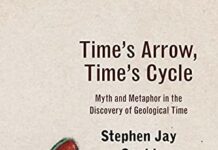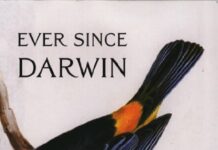
Ebook Info
- Published: 2011
- Number of pages: 432 pages
- Format: EPUB
- File Size: 0.00 MB
- Authors: Stephen Jay Gould
Description
With his customary brilliance, Gould examines the puzzles and paradoxes great and small that build nature’s and humanity’s diversity and order.
User’s Reviews
Editorial Reviews: Review “No one has written of our illusions about progress in nature with more wit and learning than Stephen Jay Gould.”―Oliver Sacks From the Inside Flap Leonardo’s Mountain of Clams and the Diet of Worms is the newest collection of best-selling scientist Stephen Jay Gould’s popular essays from “Natural History magazine (the longest-running series of scientific essays in history). It is also the first of the final three such collections, since Dr. Gould has announced that the series will end with the turn of the millennium. In this collection, Gould consciously and unconventionally formulates a humanistic natural history, a consideration of how humans have learned to study and understand nature, rather than a history of nature itself. With his customary brilliance, Gould examines the puzzles and paradoxes great and small that build nature’s and humanity’s diversity and order. In affecting short biographies, he depicts how scholars grapple with problems of science and philosophy as he illuminates the interaction of the outer world with the unique human ability to struggle to understand the whys and wherefores of existence. “From the Hardcover edition. About the Author Stephen Jay Gould was Alexander Agassiz Professor of Zoology at Harvard University and Vincent Astor Visiting Professor of Biology at New York University. A MacArthur Prize Fellow, he received innumerable honors and awards and wrote many books, including Ontogeny and Phylogeny and Time’s Arrow, Time’s Cycle (both from Harvard). Read more
Reviews from Amazon users which were colected at the time this book was published on the website:
⭐Be careful. This book is so good you may enjoy it so much you forget you already own a copy and buy it again. I did.
⭐Excellent
⭐good
⭐Excellent
⭐Stephen Jay Gould (1941-2002) wrote many other important books, such as
⭐,
⭐,
⭐,
⭐,
⭐,
⭐,
⭐,
⭐,
⭐,
⭐, etc. [NOTE: page numbers refer to the 422-page hardcover edition.]He wrote in the Introduction to this 1998 book, “This eighth volume… differs in emphasis primarily in my own increasing comfort with my unconventional approach to ‘natural history’ writing… If any overarching theme pervades this body of writing… I suppose that a groping effort toward the formulation of a humanistic natural history must unite the disparity… These essays probe, arrange, join, and parry the details within a diverse forest of data, located both in nature and in the documents of human struggle—all to access an inherently confusing but infinitely compelling world… I pay my homage to evolution in the preface to every volume of this series, and will now do so again. Of all general themes in science, no other could be so rich, so deep, so fascinating in extension, or so troubling (to our deepest hopes and prejudices) in implication… The wondrously peculiar human brain arose as a product of evolution, replete with odd (and often misleading) modes of reasoning originally developed for other purposes, or for no explicit purpose at all. The brain then discovers the central truth of evolution… And thus, is a kind of almost cosmically wicked recursion, evolution builds the brain, and the brain invents both the culture that must face evolution and the modes of reasoning that might elucidate the process of its own creation.”He suggests, “If we dismiss those scientists now judged wrong, only valuing them if they eventually saw the light, we will miss a grand opportunity to address one of the most elusive and portentous questions in scholarly life. What is the nature of genius; why, among brilliant people, so some make revolutions and other die in the dust of concepts whose time had begun to pass in their own day? What is the crucial difference between Darwin’s transcendent greatness and [James Dwight] Dana’s merely ordinary greatness?… I do not know the answer… but we can surely specify a key ingredient. Somehow, for some reason of psyche or quirk of mind, some impetus of social life or some drive of temperament, Darwin was driven to challenge, to be fearless in bringing down an intellectual universe… Dana, for other properties of the same attributes, could not, dared not, abandon the traditional hope and succor of centuries…” (Pg. 117-118)He comments on Pope John Paul II’s October 22, 1996 statement strongly supporting evolution before the Pontifical Academy of Sciences, “the Catholic Church … has long accepted both the legitimacy of evolution as a field of study and the potential harmony of evolutionary conclusions with Catholic faith… I knew that Pope Pius XII (not one of my favorite figures in twentieth-century history, to say the least) had made the primary statement in a 1950 encyclical entitled ‘Humani Generis’… Catholics could believe whatever science determined about the evolution of the human body, so long as they accepted that, at some time of his choosing, God had infused the soul into such a creature. I also knew that I had no problem with this argument—for, whatever my private beliefs about souls, science cannot touch such a subject… Pope Pius XII… had properly acknowledged and respected the separate domains of science the theology. Thus, I found myself in total agreement with Humani Generis—but I had never read the document in full…” (Pg. 273)He continues, “I quickly got the relevant writings from… the Internet. (The Pope is prominently on line, but a luddite like me is not. So I got a cyberwise associate to dredge up the documents. I do love the fracture of stereotypes implied by finding religion so hep and a scientist so square.)… I finally understand why the recent statement seems so new, revealing, and worthy of all those headlines. And the message could not be more welcome for evolutionists, and friends of both science and religion… Humani Generis focuses on the Magisterium (or Teaching Authority) of the Church… We may, I think, adopt this word and concept to express the central point of this essay and the principles resolution of supposed ‘conflict’ or ‘warfare’ between science and religion. No such conflict should exist because each subject has a legitimate magisterium, or domain of teaching authority—and these magisteria do not overlap (the principle that I would like to designate as NOMA, or ‘non-overlapping magisteria’). The net of science covers the empirical realm… The net of religion extends over questions of moral meaning and value. These two magisteria do not overlap, nor do they encompass all inquiry … To cite the usual clichés, we get the age of rocks, and religion retains the rock of age; we study how the heavens go, and they determine how to go to heaven.” (Pg. 273-274)He summarizes, “Pius had grudgingly admitted evolution as a legitimate hypothesis that he regarded as only tentatively supported and potentially (as he clearly hoped) untrue. John Paul, nearly fifty years later, reaffirms the legitimacy of evolution under the NOMA principle… but then adds that additional data and theory have placed the factuality of evolution beyond reasonable doubt…. I am not, personally, a believer or religious man in any sense of institutional commitment or practice. But I have great respect for religion, and the subject has always fascinated me, beyond almost all others (with a few exceptions, like evolution and paleontology)… I believe, with all my heart, in a respectful, even loving, concordat between our magisteria—the NOMA concept. NOMA represents a principled position on moral and intellectual grounds, not merely a diplomatic solution… Religion is too important for too many people to permit any dismissal or denigration of the comfort still sought by many folks from theology. I may, for example, privately suspect that papal insistence on divine infusion of the soul represents … a device for maintaining a belief in human superiority within an evolutionary world offering no privileged position to any creature. But I also know that the subject of souls lies outside the magisterium of science… As a moral position… I prefer the ‘cold bath’ theory that nature can be truly ‘cruel’ and ‘indifferent’… because nature does not exist for us… and doesn’t give a da_m about us (speaking metaphorically). I regard such a position as liberating, not depressing… But I recognize that such a position frightens many people, and that a more spiritual view of nature retains broad appeal…” (Pg. 280-282)He argues, “All life on earth… shares an astonishing range of biochemical similarities… Two possible scenarios… might explain these regularities: either… no other chemistry can work, or these similarities only record the common descent of all organisms on earth from a single origin that happened to feature this chemistry as one possibility among many…We cannot ask a more important question about the nature of life. But, ironically, we also cannot begin to answer this question with the data now at our disposal… If a phenomenon happens only once, we simply cannot know … whether other ‘replays’ might yield markedly different results. Unfortunately, all life on earth—the only life we know—represents… the results of a single experiment, for every earthly species evolved from the common ancestry of a single origin. We desperately need a REPETITION of the experiment… in order to make a judgment. Mars represents our first real hope for a second experiment…” (Pg. 353)Besides being a highly creative evolutionary theorist, Gould was also a brilliant writer and an engaged “public intellectual.” His presence is sorely missed on the scientific and literary scene.
⭐Stephen Jay Gould has done it again – Exposes the racist side of the foundation and development of Western Scientific Knowledge, which sadly enough, although to a much lesser degree persists to this day. Fortunately, there are more credible and enlightened men and women of science like Stephen Jay Gould to challenge and expose it. So many of the so-called men of science were heavily influenced by racism – racial and gender.Gould for example mentioned that with the exception of Friedrich Tiedemann, professor of anatomy at Heidelberg University, all early-nineteenth-century European scientists of eminence shared the view that blacks and women belonged to the lower forms of human life, because we have smaller skulls and therefore smaller brains.Gould also, rightfully so, singled out Richard Owen for praise, who although shared the same racist perspective as other eminent men of science, that (African, Papuan/Melanesian) blacks and women belonged to the lower races, wrote that: “Although in most cases the Negro’s brain is less than that of the European, I have observed individuals of the Negro race in whom the brain was as large as the average one of Caucasians; and I concur with the great physiologist of Heidelberg, who has recorded similar observations, in connecting with such cerebral development the fact that there has been no province of intellectual activity in which individuals of the pure Negro race has not distinguished themselves.”What is even more relevant, is that the negative stereotype against blacks is still wide spread and persists to this day. Gould is such a decent and honest man, that he mentioned, even he is not immune to the persistent stereotypes against blacks, as for example when he narrated an incidence on his last visit to Zimbabwe. Fortunately he caught and corrected himself, which to me is the power of his message – not to deny, bristle and bury our heads in the sand and pretend it does not exist. Although we have undeniably made progress, in some ways things have not changed a ding (I can personally testify to that). In my view, it is human failure, not an American, European or Caucasian alone. Like SJG, we should forever be alert to the distinct possibility that our actions may be harmful, unfair and based on negative stereotypes.Another important issue addressed in the book, is along the same line, namely, the mindset of even men of science to operate from the mistaken belief that human development is linear, in other words, all cultures/ societies, go through same stages of development i.e., based on a blueprint. Gould would have non-of that, in his view, which I share and based on more recent scholarly scientific work, like the rest of nature itself, things don’t develop based on human models of how it should be, nature pretty much does its own thing. It will develop regardless of our desire to control it. For sure, we are making progress in many ways to direct, alter and influence nature – we can only do that to a certain point, the rest of it is beyond human control.One of the best books I have ever read, strongly recommend it.
⭐This is not the first set of essays that Stephen Jay Gould has written and it reads like it. If you enjoy a friendly, down to earth chat about the vicissitudes of natural science then you will enjoy his relaxed but erudite style. The author ranges from fine art to the arcane with clarity and insight, and is never dull.In common with most professors, his passion for his subject bubbles to the top when he is correcting our old prejudices or adjudicating historical contoversies.This is one book about which I can say I learned a lot and was fully entertained.
Keywords
Free Download Leonardo’s Mountain of Clams and the Diet of Worms: Essays on Natural History in EPUB format
Leonardo’s Mountain of Clams and the Diet of Worms: Essays on Natural History EPUB Free Download
Download Leonardo’s Mountain of Clams and the Diet of Worms: Essays on Natural History 2011 EPUB Free
Leonardo’s Mountain of Clams and the Diet of Worms: Essays on Natural History 2011 EPUB Free Download
Download Leonardo’s Mountain of Clams and the Diet of Worms: Essays on Natural History EPUB
Free Download Ebook Leonardo’s Mountain of Clams and the Diet of Worms: Essays on Natural History





